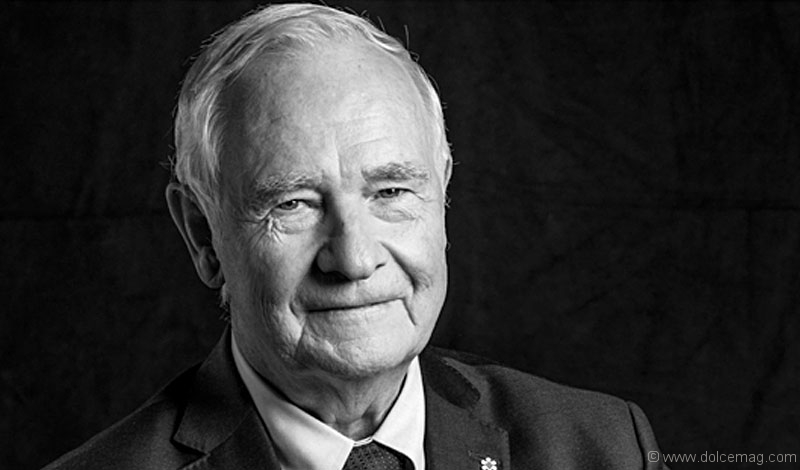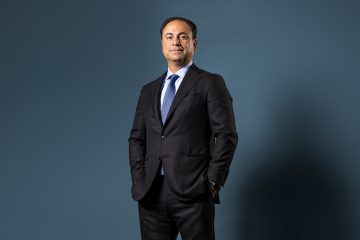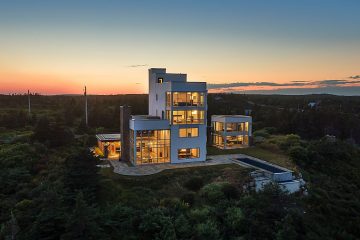Governor General David Johnston – General Direction
Governor General David Johnston on why it’s Canadian to welcome Syrian refugees, his commitment to fostering innovation and why la dolce vita means a life of service.
Behind Governor General David Johnston’s soft-spoken, grandfatherly demeanour is a weighty message. His Excellency is an ardent supporter of Canada’s Syrian refugee response, motivated to bring together the public and private sector to welcome these displaced families. He’s a sharp-minded lawyer and a regarded academic, but he’s also a man with a heart as big as his rather lengthy résumé. Dolce Magazine sat down with Canada’s 28th Governor General before his keynote address for the Oakville Community Foundation and Oakville Chamber of Commerce to find out why the Syrian refugee crisis is such a personal cause, the goal of his recently established Innovation Awards, and his definition of la dolce vita.
Q: You’ve used your office to draw support to welcoming Syrian refugees to Canada, including through a forum in December with 100 leaders from the public and private sectors. Why was this an issue you wanted to take on?
A: I think it’s because it’s so central to who we are as Canadians. When I was installed in this position a little over five years ago, the title of my installation address was “A Smart and Caring Nation: A Call to Service,” and it had three pillars: family and children, learning and innovation, philanthropy and volunteerism. I think all of those three pillars come together in a country that is both smart and caring. For me, that’s a fundamental feature in the DNA of Canada. It’s served us well, and it can serve the world well. We need the ability to bridge differences in the world to reduce levels of conflict and to learn not only how to live peacefully with our neighbours, but to relate to our neighbours in ways that are productive for both parties.
Q: There are those critical about bringing in these refugees — we have our own problems that need addressing, there are persistent safety concerns. How do you respond to critics?
A: I think those are real issues and we should hit them head-on. If for example we have scarce lower-income housing, how do we justify using it for newcomers when people that have been here for a while are still looking? I think what we’re doing here is really expanding the pie of assets and using this particular challenge to encourage Canadians to find new ways to develop our housing supply, to look at those spare rooms, and look at it out of a sense of not either/or but both/and to develop new ways of ensuring that our people already here are looked after and people coming here are looked after, and that our hearts expand to meet both needs.
I see this as a great learning opportunity. I say all the important things I’ve learned in life I’ve learned from my children, and now I’m learning from my grandchildren. So all of our children have been involved in sponsoring [Syrian refugees], but the grandchildren are interesting.
Q: What are your grandchildren doing to help?
A: One granddaughter, she’s nine years old and was adopted from an orphanage in Colombia, and her mom, they have been organizing a group to bring in a family. She said, “I’d like to do something too, mommy.” And so she started to organize a bake sale at her school. Mom did the cooking but she produced the brownies. I foolishly said I’d match her dollar for dollar, and her other grandparents said dollar for dollar. Well, she’s now up to $1,600 without the matches. So she’s doing well.
Q: How does it feel to see your family give back like this?
A: It makes me feel pretty excited and happy. It’s the manifestation of love. My wife says, “Service is love made real,” and that’s what they’re doing.
Q: You launched the Governor General’s Innovation Awards last year to celebrate, recognize and foster innovation in Canada. What’s your ultimate goal for these awards?
A: To move the needle, for Canada to be seen as one of the most innovative nations in the world, that we will compete on the basis that we embrace change — not only are we not afraid of it, we think it gives us a competitive advantage to use the talent that we’re growing in this country to be innovative. And not simply compete in a business sense, but to be a nation that really demonstrates to the world that if you think hard and think better you can improve the human condition. The other thing I would like to see is us being known as the smart, caring nation. We have smart people; we believe in talent, we believe in the opportunity to grow. Keen minds and kinder hearts.
Q: Last year you were asked to stay on for another two years so you would be in office for the 2015 election and Canada’s 150th anniversary in 2017. But, at 74, have you thought about life after your appointment ends?
A: Well, I have never worked a day in my life. I’m on a one-year leave of absence from my law firm to be a university guy, and I will continue to do that. I love the law. I love to reform the law, and I write books about that a lot. I’ve written 27 books now, most having to do with reform of the law. So I’ll continue to do that. And I’ve always done one public policy thing all the time, I was a law dean and university president for 27 years, so I’ll continue to do those sorts of things. I’ll die with my boots on. My wife says, “I married you for life but not for lunch.”
Q: What does the good life mean to you?
A: I think it’s a life that really focuses on service. How do you measure a successful life? I think you measure it by the degree to which your time on Earth has actually worked in a positive way to help others enjoy their time on Earth.




















































































No Comment